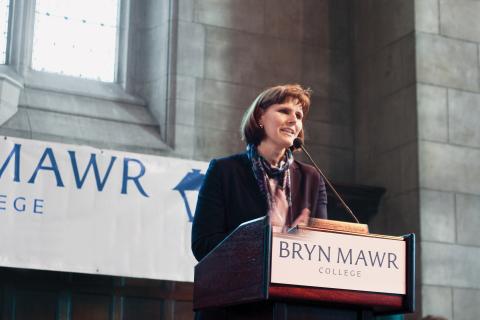Bryn Mawr and DACA
Bryn Mawr has benefited in countless ways from talents, perspectives of Dreamers.

Dear Friends:
As president of the College, I am periodically asked to endorse letters of support for stances on various public issues or policies. These requests most often come from groups of college presidents who lead institutions or organizations with which we have an ongoing relationship (such as the American Council on Education).
In consultation with the Board of Trustees, I have established several guidelines in considering whether to sign these letters on behalf of Bryn Mawr. I consider only those requests that take a position on an issue of direct relevance to our mission, such as the right to an education or equal opportunity for women, and that are as non-partisan as possible. Before signing, I assess possibilities for adverse consequences for our students, our faculty, or the College more generally. I also seek to endorse only those statements that propose solutions that have a direct, material impact on our students.
Over the past 18 months, I have joined many other college and university presidents in speaking out to support continuation of the Deferred Action for Childhood Arrivals (DACA) program. Established as policy in 2012, DACA allows immigrants who came to the U.S. before they were 16 and who were younger than 31 as of June 2012 to study or obtain work permits for two-year terms, renewable for those who do not violate the law. Our support for continued DACA protections is rooted in our fundamental commitment to providing educational opportunity to all students, to expanding educational access, and to rejecting discrimination of all sorts.
The uncertain status of DACA, particularly since the September 2017 decision to rescind DACA by March 2018, has produced anxiety and justified fear among DACA-protected students at Bryn Mawr and elsewhere. Several of our students, including students of color who are not DACA recipients, have been threatened and taunted, even in the Philadelphia suburbs. Undocumented students fear for family members who did not or could not register for protection under DACA, while at the same time fearing that the detailed information they provided
to receive DACA protections will make them vulnerable if DACA is rescinded. Many have become active in the Bi-Co Migrants Rights Coalition, adding to already full schedules of course work and campus jobs.
This winter Bryn Mawr joined the Presidents’ Alliance on Higher Education and Immigration to increase public understanding of how immigration policies and practices impact our students, campuses, and communities and to support policies that create a welcoming environment for immigrant, undocumented, and international students on our campuses. The founders of the Alliance include two educational leaders with deep ties to Bryn Mawr: David Oxtoby, trustee emeritus of Bryn Mawr and president emeritus of Pomona College, and Drew Faust ’68, president of Harvard. Bryn Mawr is among many Alliance members that have joined an amicus brief to the Second
Circuit Court of Appeals that focuses on the access to education that has been made possible by DACA and on the success of DACA-protected students in our classrooms and communities.
Bryn Mawr has benefited in countless ways from the talents and perspectives that Dreamers have brought to our campus, including in learning and changing to better support these students. For federal policy to discriminate against their admission would endorse discrimination on the basis of national origin. It is my hope that the courts will agree.
Sincerely,
Kim Cassidy
President
Published on: 06/10/2018
